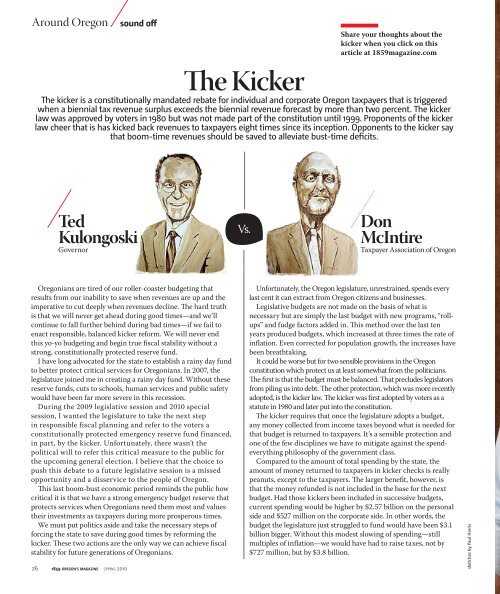1859 Spring 2010
1859 Spring 2010
1859 Spring 2010
Create successful ePaper yourself
Turn your PDF publications into a flip-book with our unique Google optimized e-Paper software.
Around Oregon<br />
sound off<br />
The Kicker<br />
Share your thoughts about the<br />
kicker when you click on this<br />
article at <strong>1859</strong>magazine.com<br />
The kicker is a constitutionally mandated rebate for individual and corporate Oregon taxpayers that is triggered<br />
when a biennial tax revenue surplus exceeds the biennial revenue forecast by more than two percent. The kicker<br />
law was approved by voters in 1980 but was not made part of the constitution until 1999. Proponents of the kicker<br />
law cheer that is has kicked back revenues to taxpayers eight times since its inception. Opponents to the kicker say<br />
that boom-time revenues should be saved to alleviate bust-time deficits.<br />
Ted<br />
Kulongoski<br />
Governor<br />
Vs.<br />
Don<br />
McIntire<br />
Taxpayer Association of Oregon<br />
Oregonians are tired of our roller-coaster budgeting that<br />
results from our inability to save when revenues are up and the<br />
imperative to cut deeply when revenues decline. The hard truth<br />
is that we will never get ahead during good times—and we’ll<br />
continue to fall further behind during bad times—if we fail to<br />
enact responsible, balanced kicker reform. We will never end<br />
this yo-yo budgeting and begin true fiscal stability without a<br />
strong, constitutionally protected reserve fund.<br />
I have long advocated for the state to establish a rainy day fund<br />
to better protect critical services for Oregonians. In 2007, the<br />
legislature joined me in creating a rainy day fund. Without these<br />
reserve funds, cuts to schools, human services and public safety<br />
would have been far more severe in this recession.<br />
During the 2009 legislative session and <strong>2010</strong> special<br />
session, I wanted the legislature to take the next step<br />
in responsible fiscal planning and refer to the voters a<br />
constitutionally protected emergency reserve fund financed,<br />
in part, by the kicker. Unfortunately, there wasn’t the<br />
political will to refer this critical measure to the public for<br />
the upcoming general election. I believe that the choice to<br />
push this debate to a future legislative session is a missed<br />
opportunity and a disservice to the people of Oregon.<br />
This last boom-bust economic period reminds the public how<br />
critical it is that we have a strong emergency budget reserve that<br />
protects services when Oregonians need them most and values<br />
their investments as taxpayers during more prosperous times.<br />
We must put politics aside and take the necessary steps of<br />
forcing the state to save during good times by reforming the<br />
kicker. These two actions are the only way we can achieve fiscal<br />
stability for future generations of Oregonians.<br />
26 <strong>1859</strong> oregon's magazine spring <strong>2010</strong><br />
Unfortunately, the Oregon legislature, unrestrained, spends every<br />
last cent it can extract from Oregon citizens and businesses.<br />
Legislative budgets are not made on the basis of what is<br />
necessary but are simply the last budget with new programs, “rollups”<br />
and fudge factors added in. This method over the last ten<br />
years produced budgets, which increased at three times the rate of<br />
inflation. Even corrected for population growth, the increases have<br />
been breathtaking.<br />
It could be worse but for two sensible provisions in the Oregon<br />
constitution which protect us at least somewhat from the politicians.<br />
The first is that the budget must be balanced. That precludes legislators<br />
from piling us into debt. The other protection, which was more recently<br />
adopted, is the kicker law. The kicker was first adopted by voters as a<br />
statute in 1980 and later put into the constitution.<br />
The kicker requires that once the legislature adopts a budget,<br />
any money collected from income taxes beyond what is needed for<br />
that budget is returned to taxpayers. It’s a sensible protection and<br />
one of the few disciplines we have to mitigate against the spendeverything<br />
philosophy of the government class.<br />
Compared to the amount of total spending by the state, the<br />
amount of money returned to taxpayers in kicker checks is really<br />
peanuts, except to the taxpayers. The larger benefit, however, is<br />
that the money refunded is not included in the base for the next<br />
budget. Had those kickers been included in successive budgets,<br />
current spending would be higher by $2.57 billion on the personal<br />
side and $527 million on the corporate side. In other words, the<br />
budget the legislature just struggled to fund would have been $3.1<br />
billion bigger. Without this modest slowing of spending—still<br />
multiples of inflation—we would have had to raise taxes, not by<br />
$727 million, but by $3.8 billion.<br />
sketches by Paul Harris

















